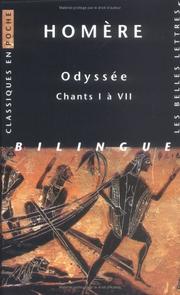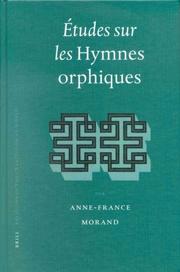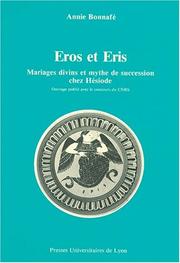| Listing 1 - 9 of 9 |
Sort by
|

ISBN: 2251799575 2251799583 2251799591 9782251799575 9782251799582 9782251799599 Year: 2012 Volume: 58- Publisher: Paris: Les Belles Lettres,
Abstract | Keywords | Export | Availability | Bookmark
 Loading...
Loading...Choose an application
- Reference Manager
- EndNote
- RefWorks (Direct export to RefWorks)
Book
Year: 2011 Publisher: Lyon: Université Jean-Moulin Lyon III,
Abstract | Keywords | Export | Availability | Bookmark
 Loading...
Loading...Choose an application
- Reference Manager
- EndNote
- RefWorks (Direct export to RefWorks)
Classical Greek poetry --- Astrology, Greek --- Astrology in literature --- Greek poetry
Book
ISBN: 9782251742137 2251742131 Year: 2012 Volume: 14 Publisher: Paris: Les Belles Lettres,
Abstract | Keywords | Export | Availability | Bookmark
 Loading...
Loading...Choose an application
- Reference Manager
- EndNote
- RefWorks (Direct export to RefWorks)
Euphorion, --- Euforió, --- Euforión, --- Euforione, --- Euphorion, - of Chalcis, - approximately 276 B.C.- - Translations into French --- Euphorion, - of Chalcis, - approximately 276 B.C. --- -Euphorion, --- Classical Greek poetry - Critical edition. --- -Classical Greek poetry - Critical edition. --- -Euphorion, - of Chalcis, - approximately 276 B.C.-
Book
ISBN: 9788804627128 8804627123 Year: 2013 Publisher: [Milan, Italy]: A. Mondadori,
Abstract | Keywords | Export | Availability | Bookmark
 Loading...
Loading...Choose an application
- Reference Manager
- EndNote
- RefWorks (Direct export to RefWorks)
881 --- Literature Greek Classical Greek poetry --- Pindar --- Pindar. --- Translations into Italian --- Pindar - Translations into Italian --- Pindar. - Olympian odes
Book
ISBN: 9782904974403 2904974407 Year: 2011 Volume: 38 Publisher: Paris [Lyon] De Boccard Ed. CEROR
Abstract | Keywords | Export | Availability | Bookmark
 Loading...
Loading...Choose an application
- Reference Manager
- EndNote
- RefWorks (Direct export to RefWorks)
Greek poetry --- Astrology in literature --- Astrology, Greek. --- Poésie grecque --- Astrologie dans la littérature --- Astrologie grecque --- History and criticism --- Congresses. --- Histoire et critique --- Congrès --- Classical Greek poetry --- Astrology, Greek --- Conferences - Meetings --- Poésie grecque --- Astrologie dans la littérature --- Congrès --- Astrologie --- Poésie antique --- Dans la littérature --- Thèmes, motifs
Book
ISBN: 0902089234 9780902089235 Year: 1972 Volume: 6 Publisher: London: Variorum,
Abstract | Keywords | Export | Availability | Bookmark
 Loading...
Loading...Choose an application
- Reference Manager
- EndNote
- RefWorks (Direct export to RefWorks)
Slavs --- Cartularies. --- Slaves --- Cartulaires --- History --- Histoire --- Byzantine Empire --- Empire byzantin --- Sources. --- Sources --- Cartularies --- 881 --- Literature Greek Classical Greek poetry --- Slavic race --- Ethnology --- Indo-Europeans --- Chartularies --- Archives --- Manuscripts --- Byzantium (Empire) --- Vizantii︠a︡ --- Bajo Imperio --- Bizancjum --- Byzantinē Autokratoria --- Vyzantinon Kratos --- Vyzantinē Autokratoria --- Impero bizantino --- Bizantia --- Slavs - Balkan Peninsula - History - Sources --- Byzantine Empire - History - Sources
Book
ISBN: 9782251742069 2251742069 Year: 2010 Volume: 7 Publisher: Paris: Les Belles Lettres,
Abstract | Keywords | Export | Availability | Bookmark
 Loading...
Loading...Choose an application
- Reference Manager
- EndNote
- RefWorks (Direct export to RefWorks)
Orphée, prophète païen de la révélation biblique. Tel est le portrait que les Juifs d'Alexandrie, à partir du IIIe siècle avant J.-C., dressent du cithadère que la tradition célèbre pour son chant miraculeux et son rôle dans l'introduction des mystères. Leur objectif est double : idéalement, convaincre les Grecs de renoncer au polythéisme pour embrasser le monothéisme qu'aurait prôné leur tout premier théologien ; plus concrètement, raffermir leurs propres coreligionnaires dans leur foi, en leur montrant qu'elle remonte à l'origine de cette culture grecque qu'ils admirent tant. Il leur suffit pour cela de fabriquer, à partir d'anciens vers mis sous le nom d'Orphée par les païens, un poème dans lequel celui-ci, finalement converti, chante le Dieu unique et le révèle à son disciple Musée — poème parfois alors intitulé Testament d'Orphée. Ce nouveau « discours sacré » (hieros logos) nous est parvenu, après de multiples remaniements au gré de ses citations, sous la forme de fragments de longueur inégale, par l'intermédiaire des auteurs chrétiens des six premiers siècles.Après une étude de la littérature et de la pseudépigraphie judéo-hellénistique dans laquelle s'inscrit le poème, Fabienne Jourdan analyse sa réception chrétienne et tente de reconstruire les différentes étapes de sa composition et transmission. Elle propose ensuite une traduction et un commentaire détaillé de chacune de ses rédactions successives.
Greek poetry --- Monotheism --- Church history --- Proselytizing --- Jewish authors. --- History and criticism. --- Judaism --- History. --- Orphic hymns --- Translations. --- Classical Greek poetry --- Critical edition --- History --- Jewish authors --- History and criticism --- Orphica --- Poesia Orphica --- Khimnite na Orfeĭ --- Hymni Orphici --- Orphei hymni --- Apostolic Church --- Christianity --- Church, Apostolic --- Early Christianity --- Early church --- Primitive and early church --- Primitive Christianity --- Fathers of the church --- Great Apostasy (Mormon doctrine) --- Pantheism --- Religion --- Theism --- Trinity --- Polytheism --- Greek literature --- Convert making --- Proselyting --- Proselytism --- Proselytization --- Persuasion (Psychology) --- Conversion --- Missions --- Littérature grecque hellénistique --- Auteurs juifs.

ISSN: 09277633 ISBN: 9004120300 900430150X 9789004120303 Year: 2001 Volume: 143 Publisher: Leiden: Brill,
Abstract | Keywords | Export | Availability | Bookmark
 Loading...
Loading...Choose an application
- Reference Manager
- EndNote
- RefWorks (Direct export to RefWorks)
The book is a study of the Orphic Hymns , a collection of 87 Greek texts in hexameter addressed to various deities. These hymns are closely related to one another and seem to originate in Asia Minor during the first centuries of the Christian era. The great originality of this corpus is that a link can be traced between a set of beliefs, rituals, offerings and mysteries, and a group of believers. Surprisingly the Hymns has been generally neglected. Les études sur les Hymnes orphiques begins with a study of the genre. The Hymns are essentially composed of long lists of epithets and are therefore distinctive. Through the choice of epithets in the different hymns and a comparision between the different texts it is possible to trace allusions to myths, to rituals and to mysteries related to the gods. This first part also concentrates on the literary ways of expressing religious ideas. The group using this text referred to the legendary figure Orpheus as the composer of the Hymns . It is therefore not surprising to find Dionysos at the center of this text. The basic approach is to compare the content of the Hymns to what we know and do not know about orphism. Questions such as vegetarianism, prohibition of beans, belief in metempsychosis, the content of the mysteries arise. It may seem awkward to find typically orphic gods, such as Protogonos, next to traditional gods and local deities from Asia Minor. Finally, the group was organised and the participants bore titles such as boukolos , the oxherd. A large place is given to epigraphy. The aim is to fit these elements to a definition of orphism during the first centuries of our era and to put together an image of this particular group. This book will be essential to scholars interested in orphism, in Greek religion, in religion at the beginning of Christianity, in literature and in hymns.
Ancient philosophy --- Antieke filosofie --- Filosofie [Antieke ] --- Filosofie [Griekse ] --- Filosofie [Romeinse ] --- Filosofie van de Oudheid --- Greek philosophy --- Griekse filosofie --- Philosophie ancienne --- Philosophie antique --- Philosophie de l'Antiquité --- Philosophie grecque --- Philosophie romaine --- Philosophy [Ancient ] --- Philosophy [Greek ] --- Philosophy [Roman ] --- Roman philosophy --- Romeinse filosofie --- Hymns, Greek (Classical) --- Hymnes grecs anciens --- History and criticism --- Histoire et critique --- Orphic hymns --- Dionysia. --- Dionysia --- 881 --- 292.38 --- Orphic mysteries --- Orphism --- Cults --- Literature Greek Classical Greek poetry --- Religion Classical Greek and Roman Rites and ceremonies --- Orphica --- Poesia Orphica --- Khimnite na Orfeĭ --- Hymni Orphici --- Orphei hymni --- History and criticism.

ISBN: 2729702601 Year: 1985 Publisher: Lyon : Presses universitaires de Lyon,
Abstract | Keywords | Export | Availability | Bookmark
 Loading...
Loading...Choose an application
- Reference Manager
- EndNote
- RefWorks (Direct export to RefWorks)
Eros (Greek deity) in literature. --- Gods, Greek, in literature. --- Marriage in literature. --- Mythology, Greek, in literature. --- Religious poetry, Greek --- History and criticism. --- Eros (Greek deity) in literature --- Gods, Greek, in literature --- Marriage in literature --- Mythology, Greek, in literature --- -881.0109 --- 292.13 --- Greek religious poetry --- Greek poetry --- History and criticism --- Literature Greek Classical Greek poetry of the ancient period History, description, critical appraisal --- Religion Classical Greek and Roman Mythology --- Hesiodus. --- Gesiod --- Geziod --- Esiodo --- Hēsiodos --- Hezjod --- Hesiodus --- Hésiode --- Hesíodo --- Hesiyodos --- הסיודוס --- Ἡσίοδος --- Hesiodos --- Hesiod
| Listing 1 - 9 of 9 |
Sort by
|

 Search
Search Feedback
Feedback About UniCat
About UniCat  Help
Help News
News